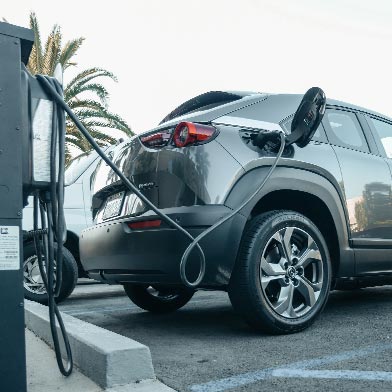If you’re shopping for a new vehicle, consider the pros and cons of purchasing a gasoline-powered or electric vehicle.

Table of Contents
For many years, drivers have had a choice of traditional gasoline-powered or electric vehicles. While gas-powered cars have been around for well over a century, electric vehicles are a relatively new choice. Their popularity is on the upswing due to their environmental benefits and rising gas prices. If you’re shopping for a new vehicle, you might wonder which approach is best for you. Here are some pros and cons of each to consider.
GAS-POWERED VEHICLES
Pros: Gas-powered cars rely on an internal combustion engine to generate power. Burning gasoline creates energy, which turns the wheels and propels the car forward. Most feel that gas-powered cars are simple, reliable, and easily understood by many, making them relatively easy to maintain and repair.
Cons: Gas-powered cars can have significant drawbacks, led by their impact on the environment. Burning gasoline releases carbon dioxide and other pollutants, contributing to air pollution and climate change. They’re also not as fuel-efficient as electric vehicles, which can result in higher fuel costs and increased carbon emissions.
ELECTRIC VEHICLES
Pros: Electric vehicles are powered solely by electricity that is stored in a battery. They produce no emissions and are much more environmentally friendly compared to traditional gasoline-powered cars. They are also much more efficient, meaning that they consume less energy per mile driven and have lower operating costs compared to traditional gasoline-powered cars. Electric vehicles have several other advantages, too. For example, they are usually smoother and quieter to drive than gasoline-powered cars.
Electric vehicles have instant torque, which means they can accelerate quickly and smoothly from a stopped position, which can provide a more enjoyable driving experience. Electric vehicles also have a lower total cost of ownership compared to gasoline-powered cars as they require less maintenance and have lower fuel costs.
Cons: The most significant potential drawback to electric cars is their limited range: They must be recharged more frequently than gasoline-powered cars. Electric vehicles cost about $10,000 more to purchase than gas-powered cars,1 making them less accessible to many consumers. Also, the prevalence of electric vehicle charging station infrastructure for electric vehicles is still limited. It can be difficult to find a place to charge your vehicle when traveling the open road.
Overall, both traditional gasoline-powered cars and electric vehicles have their pros and cons. Gas-powered cars are simple, reliable, and sometimes inexpensive to purchase when bought used, but they are also less fuel-efficient and have a larger carbon footprint. Electric vehicles are more environmentally friendly, fuel-efficient, and have a lower total cost of ownership, but they are also more expensive and have a limited range. Ultimately, the choice between a gasoline-powered car and an electric vehicle will depend on your individual needs, preferences, and budget.
1https://www.cbsnews.com/news/electric-car-2023-costs-gas-vehicles/












